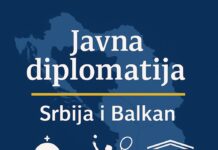Our round-up of news, notes, tips, and Tweets exhibiting how public diplomacy affects the world each and every day.
Dear gastrodiplomacy addicts, you’re welcome.
As part of a promotion for the Sydney International Food Festival, the advertising agency WHYBINTBWA designed 18 national flags using foods each country is commonly associated with and that would also match the colors of the flag. [Marvelous]
Caroline Kennedy may look the role of a traditional ambassador, but public diplomacy issues (both pursued and thrust upon her) have greatly affected her short time in office.
The comment, coming soon after her embassy issued a rare criticism of the prime minister for visiting a controversial war shrine, indicated that the often reserved Ms. Kennedy might be more of an outspoken envoy than many expected, willing to take on subjects the Japanese prefer to discuss behind closed doors. And she is doing so using a social medium that allows for little of the nuance that shapes formal Japanese diplomatic communication; Ms. Kennedy is an active Twitter user, posting in English and Japanese for her more than 75,000 followers. [New York Times]
“There are no gay people in Sochi,” the mayor tells BBC Panorama. Another triumph for Russia’s Olympic PR effort!! http://t.co/NVeVNbWMDc
— Shaun Walker (@shaunwalker7) January 27, 2014
Speaking of ambassadors, Gary Locke’s accomplishments as U.S. ambassador to China would make any public diplomat proud.
In a recent interview, he pointed to the waiting period for interviews for Chinese applying for U.S. visas: less than five days on average, down from as high as 100 days a few years ago. He noted that in the past two years, more Chinese investment has poured into the United States than in the previous 11 years combined. His theory as ambassador, Locke said, is that by focusing on the details — such as the visa process — you can move the needle on much bigger goals, like exposing more Chinese visitors to American-style democracy and values. “It’s not just the numbers, but what those numbers represent,” he said. [Washington Post]
86 French embassies, consulates and permanent missions are on Twitter! Check out our list: https://t.co/RFNo1wyxOr #France #digitaldiplomacy
— French MFA (@francediplo_EN) January 26, 2014
Estonia has gone all in on a digital government, and now they are sharing the lessons learned with other countries.
What makes this tiny country interesting in terms of governance is not just that the people can elect their parliament online or get tax overpayments back within two days of filing their returns. It is also that this level of service for citizens is not the result of the government building a few websites. Instead, Estonians started by redesigning their entire information infrastructure from the ground up with openness, privacy, security, and ‘future-proofing’ in mind. [The Atlantic]
‘Cultural threats’ a major national #security focus for #China – a flip-side of #softpower | http://t.co/uwHFj4NA5L
— Line 21 (@line21project) January 25, 2014
The Institute for Cultural Diplomacy posted an interesting list of cultural diplomacy initiatives that have fostered sustainable economic development and growth in Africa over the last 20 years.
The United Nations post-2015 Development Agenda underlines the need to transform economies for jobs and inclusive growth. Innovation, human creativity, and technology have the potential to improve the state of national economies and to ensure a long-term sustainable economic development. Most of all, innovative non-resource-based activities encourage economic and social inclusion of youth and women by providing them with equal opportunities to take an active part in economic activities. In addition to that, a non-traditional approach towards economy fosters sustainable consumption that builds a long-lasting bridge between the needs of the present and the ability of future generations to meet their own needs. [Institute for Cultural Diplomacy]
Carrie Mae Weems #CulturalDiplomacy 1st African-American woman to have a retrospective @ the Guggenheim http://t.co/js1XywTlPG v @NewYorker
— Dante Licona (@dantrix88) January 26, 2014
“Soft power” used four times in this short article about the diplomatic relationship between China and France. Perhaps a bit of revisionism as well.
Jan 27 marks the 50th anniversary of the establishment of diplomatic ties between the People’s Republic of China and the Republic of France. Being the first between China and a Western power, China-France ties have developed beyond ordinary bilateral ties. The two countries’ soft power and interactions have played a key role in the development of this bilateral ties. Both have rich cultural histories and made huge contributions to political thought, literature, art and technology. [Xinhua]
well done @lordemusic – now two Grammies! And the humble way you receive them makes you an exceptional rep for NZ. #culturaldiplomacy
— Paul Foster-Bell MP (@PARFosterBell) January 27, 2014
Michael Barr, a lecturer from Newcastle University, says the key to China leveraging its soft power is coming to terms with the modern Chinese identity.
China needs to understand more about its own identity and values in order to develop effective soft power abroad, says Michael Barr, lecturer in international politics at Newcastle University, England. Barr, who wrote the 2011 book Who’s Afraid of China? The Challenges of Chinese Soft Power, says a key challenge to Chinese soft power lies in the discrepancy between the traditional Chinese values it promotes and modern values emerging from its society. “Because the Chinese identity is changing, China is having a hard time deciding what is the positive contribution of Chinese soft power,” Barr says. [China Daily Africa]
FYI: #Israeli MFA cadets open blog http://t.co/2W2APy7Rh0 @DiplomacyEdu @Ediplomacy @DiplomacyPlaza @Public_Diplomat
— Sharon Singer (@gushbasar) January 27, 2014
Interesting polling conducted to gauge the perceptions of Turkish citizens.
TESEV a Turkish think tank have been doing polls on The Perception of Turkey in the Middle East for the past 5 years and I’ve just come across their latest version. The fieldwork was conducted in August and December last year and covers 14 countries across the Middle East and North Africa. Although there are lots of questions about Turkey the poll covers other regional issues. Lots if interesting stuff here including data on media use but a few highlights. [Public Diplomacy, Networks and Influence]
It doesn’t ‘simplify it’ but a good watch for those who want to ‘simplify it’ #publicdiplomacy ‘Who run the EU?’ On http://t.co/eDFzDbbpr4
— Angelina Eichhorst (@aneichhorst) January 26, 2014
Brief, general overview of cultural diplomacy in Burkina Faso.
An opportunity and agreement for Burkina Faso to export local products that were pleasing also materialised from the pre-festival talks. This illustrates the effectiveness of dialague, exchanging of ideas and willingness to open up cultures for stakeholders beyond the country and the continent. Furthermore, Burkinabe artists are to be invited to Germany by the cultural promoters of this country through hoteliers, airlines and restaurants as there are expectations that Burkina Faso that will host a larger FESTICO event next year in 2015. The German delegation impressed by the Burkinabe promised to return with more men and women next year according to the Burkina Faso in Switzerland. [Ecowas Tribune]
Want to build your #PublicDiplomacy networks develop your tool kit? Apply #Botswana for Summer Institute in PD: http://t.co/ARkUBau7ak
— UNDP_Botswana (@UNDP_Botswana) January 25, 2014
photo credit: WHYBINTBWA













